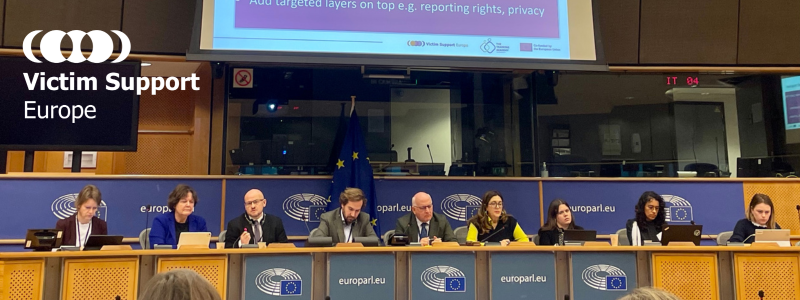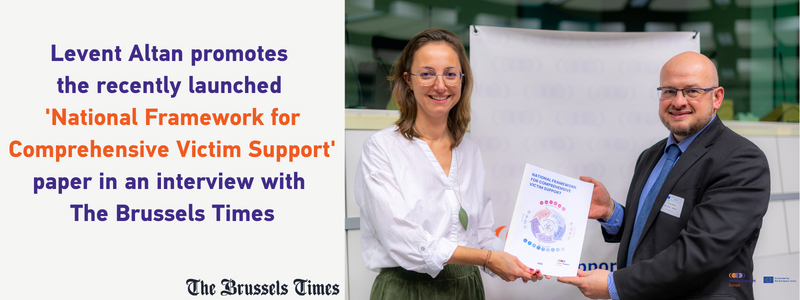VSE Engages in Key Talks on Enhanced Victims’ Rights Directive at European Parliament

VSE Engages in Key Talks on Enhanced Victims’ Rights Directive at European Parliament
In a series of influential meetings held at the European Parliament on 8th and 15th November, Victim Support Europe (VSE) was given the opportunity to participate in crucial discussions on the revision of the 2012 Victims’ Rights Directive . Led by MEPs Javier Zarzalejos, Soraya Rodríguez Ramos, Saskia Bricmont and Kira Peter-Hansen, these pivotal sessions emphasised the need for stakeholder consultations and shadow meetings, fostering a collaborative approach to refining the proposed Directive.
On 8th November 2023, VSE had the chance to participate in a stakeholders’ consultation organised by shadow rapporteurs for the Greens/EFA political groups, MEPs Bricmont and Peter-Hansen, on the revision of the Directive. The meeting brought together participants holding a variety of views on, and listing various priorities for, the EU legislation which enables victims of crimes to access their rights to support, justice, information and protection across Europe.
On 15th November 15th, MEPs Javier Zarzalejos and Soraya Rodríguez Ramos, co-rapporteurs on the Victims’ Rights Directive file, led the 2nd shadow meeting, further developing stakeholder engagement.
The primary goal of these gatherings was to facilitate an exchange of views, providing MEPs with valuable insight as they formulate amendments to the Commission’s proposal. These meetings play a pivotal role in shaping the Directive, building stronger legislation which better supports and protects all victims of crime.


Key priorities raised by Victim Support Europe for the revised Directive included:
- The development and implementation of systemic and coordinated approaches for victim support, in particular through national frameworks for comprehensive victim support;
- Ensuring all policies and measures adopted follow victim-sensitive approaches and are based on victims’ needs;
- Ensuring minimum standards for victim support services, established and accessible in all Member States, and operating under defined standards;
- Facilitating victims’ access to information;
- Establishing safe justice systems for victims.
Systemic approaches should in particular seek to enhance and organise the coordination between generic (all crime) and specialist services as to address existing gaps in the fragmentation of services, and enhance the coordination across sectors of response (e.g. law enforcement, justice actors, health care and victim support sectors).
Good practices shared to that end included the AREV (Advancing Rights of Estonian Victims) project implemented by Victim Support Europe between 2020 and 2023. The project aimed to enhance the support and protection provided to Estonian victims of crime, and to improve inter-sectoral and multisciplinary cooperation between stakeholders working with victims. To that end, Victim Support Europe worked closely with the Estonian Ministry of Justice, Police and Guard Board, the Social Insurance Board, the healthcare sector, and other key stakeholders to develop, deliver and test tools and protocols for information provision, and individual needs assessment. The project showed positive outcomes in increasing cooperation between sectors and coordinate the response to victims through a common framework of action.
The various discussions underscored the challenges shared by many organisations and victim groups, emphasising the need for a comprehensive approach to designing a solid foundation that could be used to address existing problems faced by all victims of crime. Following these exchanges, the draft report published by the European Parliament marks a significant step in that direction and serves as the basis for internal parliamentary amendments.
Building on the experience of its member organisations, as well as many years of research into the implementation of the Directive, Victim Support Europe played a proactive role in the discussions. VSE aims to ensure that the voices of victims, and the challenges they and front-line practitioners encounter, positively contribute to any comprehensive and victim-sensitive legislative approach that results from these meetings.
Looking ahead, it is understood that the review will continue throughout 2024, culminating in the adoption of amendments to the legislation later in the year, under the Hungarian presidency of the Council. The collaborative efforts between MEPs and Victim Support Europe underscore a shared commitment to crafting legislation that truly addresses the needs of victims and advances justice.
Recommend0 recommendationsPublished in Uncategorised


